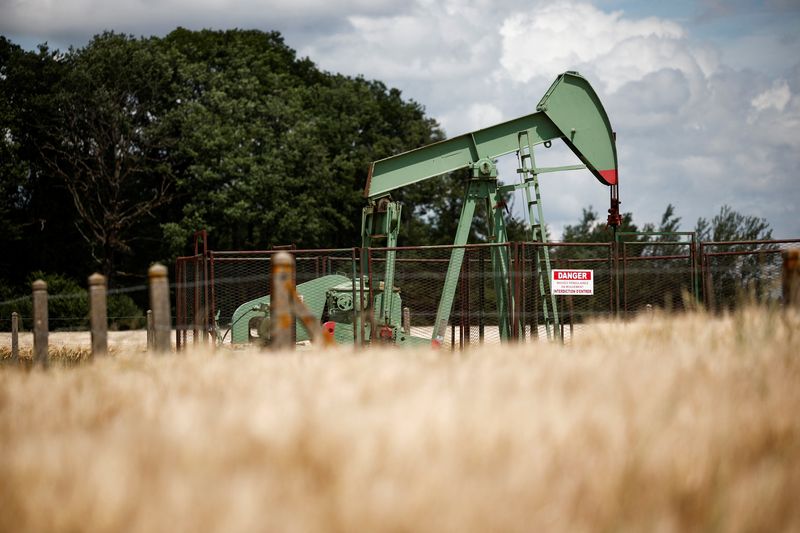By Laila Kearney, Paul Carsten and Robert Harvey
NEW YORK (Reuters) -Oil prices climbed more than $2 a barrel on Monday after news that crude production at Norway's Johan Sverdrup oilfield had been halted, which added to earlier gains stemming from escalation of the Russia-Ukraine war.
Brent crude futures settled at $73.30 a barrel, gaining $2.26, or 3.2%. U.S. West Texas Intermediate crude futures settled at $69.16 a barrel, rising $2.14, or 3.2%.
Equinor said it had halted output from its Johan Sverdrup oilfield, western Europe's largest, due to an onshore power outage. Work to restart production was under way, an Equinor spokesperson said, but it was not immediately clear when it would resume.
Oil prices extended their gains on the outage news, which indicated a possible tightening of the North Sea crude market, UBS analyst Giovanni Staunovo told Reuters. Physical supply of crude oil from the North Sea underpins the Brent futures complex.
Kazakhstan's biggest oil field Tengiz, operated by U.S. major Chevron (NYSE:CVX), has reduced oil output by 28%-30% due to ongoing repairs, helping to further tighten global supplies. Repairs were expected to be complete by Saturday, the country's energy ministry said.
Prices also climbed as Russia's war in Ukraine escalated over the weekend.
In a significant reversal of Washington's policy, President Joe Biden's administration allowed Ukraine to use U.S.-made weapons to strike deep into Russia, two U.S. officials and a source familiar with the decision said on Sunday.
The Kremlin said on Monday that Russia would respond to what it called a reckless decision by Biden's administration, having previously warned that such a decision would raise the risk of a confrontation with the U.S.-led NATO alliance.
"Biden allowing Ukraine to strike Russian forces around Kursk with long-range missiles might see a geopolitical bid come back into oil, as it is an escalation of tensions there in response to North Korean troops entering the fray," IG markets analyst Tony Sycamore said.
There has been little impact on Russian oil exports so far, however oil prices could rise further if Ukraine targets more oil infrastructure, said Saul Kavonic, an energy analyst at MST Marquee.
Russia unleashed its largest airstrike on Ukraine in almost three months on Sunday, causing severe damage to the country's power system.
Brent and WTI fell more than 3% last week due to weak data on China's refinery run rates, and after the International Energy Agency forecast that global oil supply would exceed demand by more than 1 million barrels per day in 2025, even if output cuts remain in place from OPEC+.

Traders began shifting WTI trades to the January contract ahead of the expiration of the December contract on Wednesday. The spread between the two contracts flipped for the first time since February into a contango structure, where the later contract traded higher than the front-month contract, meaning traders expected price to rise.
"The expiration is going to a wild one," said Bob Yawger, director of energy futures at Mizuho (NYSE:MFG).